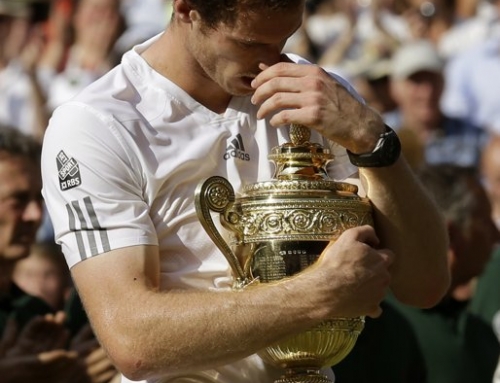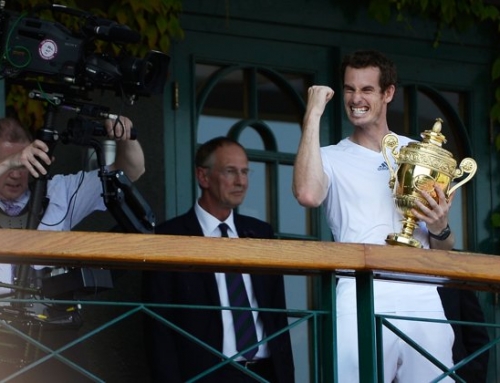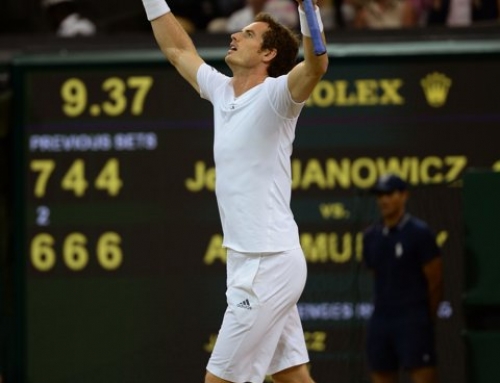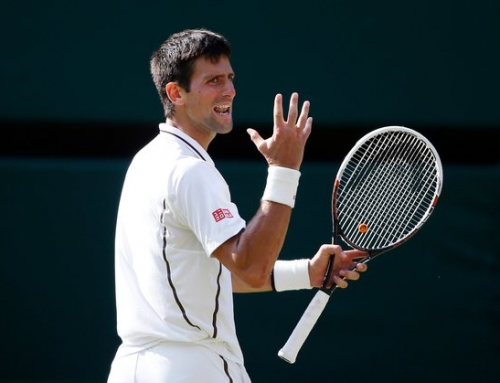 Wimbledon Monday, in which all the men and women play their fourth round matches, is perhaps the most sought-after ticket short of the men’s championships itself. While fourth round matches generally favor the higher seed, with eight matches being played, there is usually an upset. Indeed, form almost held, but there was one upset. Andy Roddick was eliminated by unheralded Yen-Hsun Lu.
Wimbledon Monday, in which all the men and women play their fourth round matches, is perhaps the most sought-after ticket short of the men’s championships itself. While fourth round matches generally favor the higher seed, with eight matches being played, there is usually an upset. Indeed, form almost held, but there was one upset. Andy Roddick was eliminated by unheralded Yen-Hsun Lu.
It’s on occasions like this that you learn something about a player you’ve hardly known. It’s used to be quite exceptional to find a player from a country that isn’t known for producing tennis players, but tennis has become a much more international sport than it once was.
Fifty years ago, the number of countries with players playing world-class tennis was exceedingly tiny. If you just pick the countries that host the Slams–the United States, France, Australia, and the UK–you’d probably account for over 80% of men’s finalists at Wimbledon prior to 1960. Add the following countries–Germany, New Zealand, Czechoslovakia/Czech Republic, Egypt, Denmark, Spain, Romania, Russia, Sweden–you would pretty much cover the nationality of every finalist up to 1991.
People often proclaim players like Rod Laver as the greatest of all time, with his two Grand Slams. But, at the time Laver did this, there were a handful of countries with really good players, which was pretty much Australia and the United States, and Australia had a bigger group of better players. One could imagine if there were rankings, the Australians might be half of the top 10. You simply had to be the best among a group of players you practiced with all the time.
Laver had two advantages few other players had. As an amateur, he was part of Harry Hopman’s system which emphasized practices that were tougher than actual matches, and who preached fitness. This was modern tennis training when the rest of the world knew little of how to train for tennis, other than hitting balls. As a pro, Laver was one of a handful of players that went around barnstorming with the best pros in the business. This was not a group of hundreds of players, but perhaps 10-15 players. While they went around playing matches like a rock band goes to venues at rock arenas, they continually honed their game, while the rest…well, there was no rest. There were no other professionals. Today, hundreds of players play dozens of tournaments each year, and so the pool of potential greatness is magnified.
Things are different today. Players come from countries that didn’t exists 25 years ago. Serbia, Czech Republic, Croatia, Slovenia, Slovakia, Kazkhstan are all producing world-class players. Before Roger Federer, Switzerland had produced only a smattering of top pros, and no one contending for number 1. Names like Jacob Hlasek and Marc Rosset were the Swiss great. They lacked the Spanish or French federations that cranked out pros left and right. Yet, out of that system, they produced Roger Federer. Bjorn Borg was a loner, not part of the system that eventually developed Wilander, Edberg, Nystrom and the Swedish horde (alas, the Swedes are pretty much Robin Soderling now).
With the popularity of tennis in the world, players now come from pretty much anywhere, and their backgrounds aren’t necessarily middle to upper class families.
Witness one Yen-Hsun Lu. Lu is listed as being from Chinese Taipei. This is one of those nice political euphemisms that show the complex relationship between China and Taiwan. In the movie “Hero”, Jet Li plays a “superhero” warrior of sorts that is sent to assassinate the emperor, yet, he is compelled to find out what kind of emperor he is. The film portrays the emperor as wise beyond his cruelty. He does what he can to unify all of China (based loosely on the emperor who built the Great Wall). This notion of “one land” resonates strongly with the Chinese.
In the 1940s, the Nationalists rules China, but there was dissatisfaction in China and many chose to join the Communists who eventually ran the Nationalists out of China, many who fled to Taiwan. At the time, both sides, the Communists and the Nationalists believed they were legitimate government of China, and that suited both sides. When Nixon was president, he agreed the official “China” was mainland China and Taiwan became relegated to, well, not exactly a country, but not exactly one either.
There are some, in Taiwan, who believe Taiwan should be an independent country which causes mainland China some consternation. Mainland China creates a convenient falsehood that Taiwan is a renegade colony that will once come back into the fold, even though the two “countries” operate pretty much independently of each other. Such is politics. This isn’t so unusual. Greek and Turkey contest Cyprus. India and Pakistan contest Kashmir.
So when Li Na talks about China producing a top 50 male in the next 5 years, she would readily have to admit that she means mainland China even if Taiwan will probably produce a top 50 male in Yen-Hsun Lu when Wimbledon concludes. He’s just not a product of the mainland Chinese system (obviously). The name “Chinese Taipei” is also a compromise that allows Taiwan to compete in Olympic events without being labeled as Taiwan which is a kind of political faux-pas (Taipei is the capital of Taiwan).
Unlike Li Na, Lu was not really a product of an active tennis federation, at least, not quite the same level as China. Lu’s beginning were particularly unusual. If you’ve seen the small film, Napoleon Dynamite, the main character, Napoleon, gets a job at a chicken farm. The teens are given a pitcher of what seems to be raw eggs and watch the old man drink it was a refreshment. Such details are so odd and yet so accurate that you feel the director must have once had this job.
Lu’s father was a chicken farmer who sold live chickens and as a youth, Lu had to help out, catching chickens, waking up at dawn. Lu realized, early on, that this life was not for him. For one, the smell. Lu eventually focused his attention to tennis. Although his father was not a “tennis father”, knowing much more about farm life than hitting a ball, he was supportive of his son’s success.
Unfortunately, for Lu, his father passed away in 2000, prior to Lu joining the tour. Lu had hoped his father was watching him, and he dedicated his win to his father.
Lu’s results show the kind of international sport that tennis is. He sought advice on his volley from Mark Woodforde last year. He’s been training with an Argentine fitness coach, which he claims has helped his serve (stronger leg pushoff, presumably). In this respect, he’s not far from players like Li Na who have been permitted by the Chinese federation to train how she chooses (the men, not yet ranked very high, do not have this luxury).
In his post-match thoughts, Lu showed a modestly that is almost typically Chinese, reverence for those who are the stars, but also realizing that you fight anyway. When Roddick came back, improbably, to win the fourth set, Lu entertained thoughts that maybe it wasn’t his day. Roddick was the better player, after all. Lu hadn’t broken Roddick all day, but then, Roddick had barely broken him all day, either. Lu just told himself to fight and maybe good things would happen. And so when Andy Roddick lost control of his groundstrokes, hitting them long, and gave Lu an opening, Lu took the opportunity he had, and passed the 3-time finalist down-the-line, and got himself into the quarterfinals, as the only upset of the day.
So while Lu will go into his quarterfinal a decided underdog to Novak Djokovic (he’d be a decided underdog with pretty much all the remaining quaterfinalists), he’ll go out and fight.







![[Wimbledon, QF] Murray scraps out 5-set win over Verdasco to reach semifinals](https://www.essentialtennis.com/wp-content/uploads/2013/07/20130703murray-500x383.jpg)